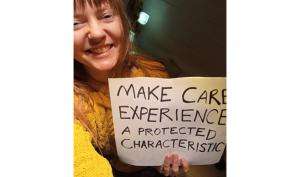Campaign to make 'care experience' the tenth protected characteristic under the Equality Act

Published by Professional Social Work magazine, 18 February, 2022
People who have been in care should be given the same protection under the Equality Act as other discriminated groups, campaigners are demanding.
They are calling on England’s Independent Review into Children’s Social Care to adopt this as one of its recommendations when they are published this spring.
Such a move would make care experience a ‘protected characteristic’ in the same way as the law treats discrimination against age, disability, race, religion, gender reassignment, sex, sexual orientation, pregnancy and maternity and marriage and civil partnerships.
The Show Us You Care Too campaign, which is led by people with experience of care, says the law change is needed to stop prejudice against a group that already suffers disadvantage.
Despite care experienced people making up around 1.4 per cent of the UK population, they account for 25 per cent of homeless people in England and a quarter of the prison population. Nearly half of all under 21-year-olds in contact with the criminal justice system have been in care.
Designating care experience a protected characteristic would force public bodies and decision-makers to consider the needs of care leavers more seriously, say campaigners.
Terry Galloway, part of the steering group, said: “A protected characteristic will create systemic change and will give voice to those most in need.
“It is important that the care review listen to what we are saying, as if it really wants to create systemic change then it must be bold and make this a firm recommendation.”
Elisha Mulvaney, a social worker who has been in care, said: “I lived in foster care and faced daily discrimination where I was treated differently from their own children.
“It hurt and made me feel worthless which then impacted me as I left care. I found it difficult to get work and settle."
Mags Mulowska, a care experienced social worker and community organiser, said: "There are so many ways that having care experience makes it more difficult for people to get on in life.
"Young people leaving care need to be met with compassion rather than judgement from the system and structures of society as well as the wider public.
"Making care experience a protected characteristic will level the playing field so that more care experienced people are able to thrive rather than just struggle to survive."
Author and campaigner Chris Wild said: “I’ve got voice and agency, I’m a published author and have a loving family. But there are so many children and care experienced people battling in this broken system crying out for help but they are silenced.
“The cycle repeats over and over. But I hear the silent screams and it haunts me.”
Charity the Together Trust is supporting the call to make care experienced people “the tenth protected characterstic under the Equality Act”.
The campaign is asking people to sign a letter to the children’s social care review, which is being led by Josh MacAlister.
The letter highlights discrimination faced by care leavers including being “automatically referred to social services when we become pregnant”.
It adds: “Some employers won’t take us on, there are criminal gangs that deliberately target us because they know our lives can be challenging and some landlords won’t rent to us if they see that a prior address was a children’s home.
“We are an oppressed group. Our lives are impacted by the stigma of being care-experienced in a multitude of ways across housing, health, education, relationships and employment.”
Making care experience a protected characteristic would make such discrimination illegal. Councils, the police and the NHS would be among organisations having to consider how their decisions and polices affect people with care experience.
“It would mean that public bodies would need to take steps to meet our needs and remove or minimise disadvantages we face,” states the letter.
“Metro mayors, combined authorities, clinical commissioning groups, regional commissioning boards and other public bodies would be well positioned to accelerate change through sharing policies and good practice.
“This would help eliminate the postcode lottery of support that care experienced people currently face.”
The campaign has been launched to coincide with Care Day, a celebration of children and young people with care experience, on 18 February.
